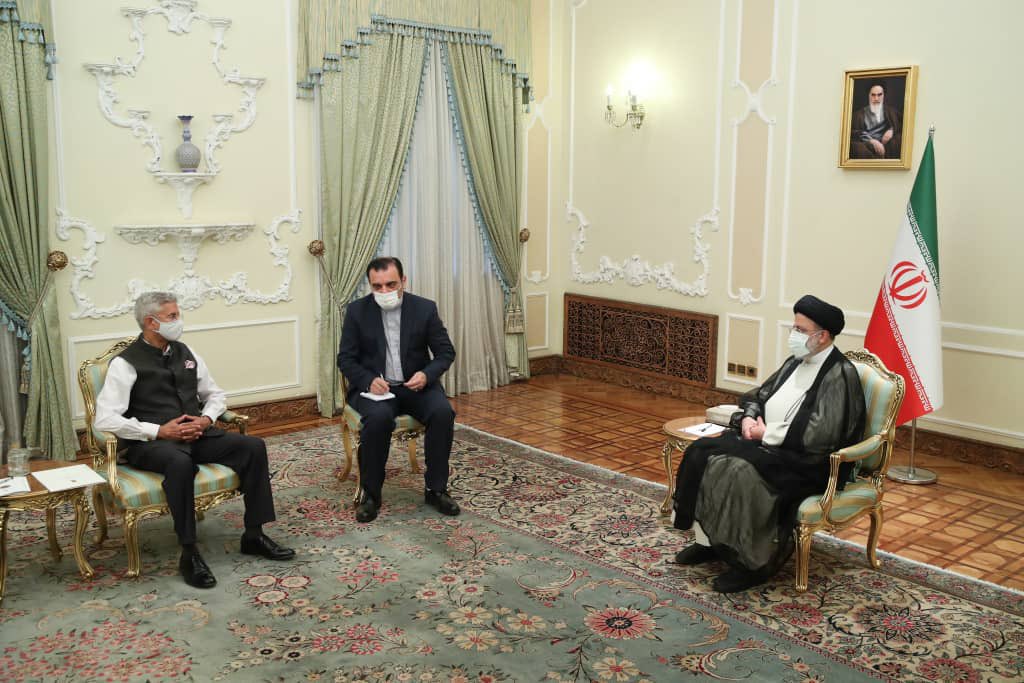Tehran: Iran and India can play a ‘constructive and useful’ role in ensuring security in the region, especially in Afghanistan, and Tehran welcomes New Delhi’s role in establishing stability in the war-torn country, newly-elected President Ebrahim Raisi told External Affairs Minister S Jaishankar here Friday.
During his meeting with Jaishankar, a day after he was sworn in as the Iranian president, Raisi underlined that the two countries should take new and distinct steps in the development of bilateral, regional and international relations with a new perspective.
This was the second meeting between the leaders of the two nations in one month. Jaishankar had met Raisi, then president-elect, July 7 during a stopover at the Iranian capital on his way to Russia.
During Friday’s meeting, the Iranian President stressed the importance of close cooperation and coordination between the two countries in developing peace and stability in the region.
“Iran and India can play a constructive and useful role in ensuring security in the region, especially Afghanistan and Tehran welcomes New Delhi’s role in the establishment of security in Afghanistan,” Raisi emphasised.
Raisi’s significant comments on India’s role in Afghanistan was issued by the Iranian president’s office in a press release.
“The fate of Afghanistan must be decided by the Afghans themselves, and we believe that if the Americans do not sabotage the situation, this issue will be resolved quickly,” Raisi added.
Along with Russia, Iran has been playing a major role in the Afghan peace process that has witnessed a renewed momentum in the wake of the withdrawal of the US forces from Afghanistan.
Jaishankar’s visit to Tehran in July coincided with Iran hosting an intra-Afghan dialogue in the country.
India has been a major stakeholder in the peace and stability of Afghanistan. It has already invested nearly USD 3 billion in aid and reconstruction activities in the war-ravaged country.
India has been supporting a national peace and reconciliation process that is Afghan-led, Afghan-owned and Afghan-controlled.
It has also been calling upon all sections of the political spectrum in Afghanistan to work together to meet the aspirations of all people in the country, including those from the minority communities, for a prosperous and safe future.
Emphasising that Iran attached special importance to establishing extensive relations with India, Raisi said: “From today on, we should take new and distinct steps in the development of bilateral, regional and international relations with a new perspective.”
He said that the Iranian government will pursue a policy of developing relations with neighbouring countries and the region, especially India.
“There are various sectors, especially in the economic and commercial fields, as well as new technologies, that we should use to promote the level of our relations,” he said.
Emphasising the need for a joint programme to increase the level of Tehran-New Delhi relations, Raisi said: “By moving in the direction of a joint cooperation programme, we can take steps to bring about different conditions at the level of relations between the two countries in the interests of the two nations”.
Welcoming Raisi’s speech at the swearing-in ceremony on the Iranian government’s will to develop relations with neighbouring countries, Jaishankar said: “I will convey your views to the President and Prime Minister of India, and we will try to maximise our cooperation”, the Iranian President’s Office quoted Jaishankar as saying.
Jaishankar on his Twitter handle said he held a “warm meeting” with Raisi Friday.
“Conveyed the personal greetings of PM@narendramodi,” Jaishankar tweeted.
Raisi, the former judiciary chief who is believed to be close to Iran’s Supreme Leader Ayatollah Ali Khamenei, was sworn in during a ceremony held at the Majles (Parliament) on Thursday.
Raisi, 60, won a landslide victory in Iran’s presidential election in June.
“His commitment to strengthening our bilateral relationship was manifest. So too was the convergence in our regional interests,” Jaishankar said, adding that he was “looking forward to working with his team.”
Iran has been a key partner for India in the strategically important Gulf region.
The two sides have been jointly focussing on improving connectivity between South East Asia and Central Asia.
At a connectivity conference in Tashkent last month, Jaishankar projected Iran’s Chabahar port as a key regional transit hub, including Afghanistan.
Located in the Sistan-Balochistan province on energy-rich Iran’s southern coast, the Chabahar port is being developed by India, Iran and Afghanistan to boost connectivity and trade ties.
The Taliban has been making rapid advances across Afghanistan by resorting to widespread violence since the US began withdrawing its troops from the country on May 1.
The US has already pulled back the majority of its forces and is looking to complete the drawdown by August 31.
Raisi assuming Iran’s presidency comes at a time of growing challenges for Tehran, whose economy has been crippled by US-led sanctions.
There are also heightened tensions with foreign powers who have blamed Iran for a deadly drone attack on a tanker near Oman last week, which Iran has denied.
PTI
